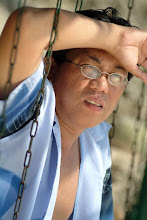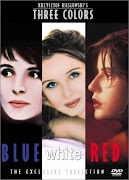 DEATH HAS REASONS to gloat and romp around with the royalty of his harvest so far this year: filmmakers Ingmar Bergman and Michaelangelo Antonioni, tenor Luciano Pavarotti, and most recently, author Madeleine L’Engle (She was 88.)
DEATH HAS REASONS to gloat and romp around with the royalty of his harvest so far this year: filmmakers Ingmar Bergman and Michaelangelo Antonioni, tenor Luciano Pavarotti, and most recently, author Madeleine L’Engle (She was 88.) With her hoard of poetry, plays, childhood fables (particularly the children’s classic, A Wrinkle in Time, etc.) and religious meditations as well as science fiction, L'Engle has "transcended both genre and generation." So much so that the sheer range of her oeuvre has been cited in the Dictionary of Literary Biography for its “peculiar splendor.”
I've been a fan of her writing since I devoured her book, Walking On Water: Reflections on Faith and Art (which I bought at the Doulos ship when it docked in Cebu in the late 90s.) If there's one book that lifted my feet an inch higher from the ground since then, this is it. No other work of non-fiction, besides those of Diane Ackerman and Pico Iyer, has unleashed a rapacity to partake of its wisdom and grace with a pilgrim's need to mark it--with underlines and dog-ears-- for a revisit time and again.
When asked where faith stops and art begins: There is no separating the two, she reasons, "it means attempting to share the meaning of my life, what gives it, for me, its tragedy and its glory."
Encouraging her readers to shift gears and slow down through the helter-skelter compulsions of survival, she argues for the imperatives of inspiration to turn the "chaos of life" into the "cosmos of art" by staying attuned to one's creative spirit: "Unless we are creators, we are not fully alive."
"Complicated creatures we are, aware of only the smallest fragment of ourselves; seeking good and yet far too often unable to tell the difference between right and wrong; misunderstanding each other and so blundering into the tragedies of warring nations, horrendous discrepancies between rich and poor, and the idiocy of a divided Christendom."
When one interviewer told her that God doesn’t send more trouble than a person can stand, L’Engle replied that she sometimes asks God, “Why are you overestimating my capacity to this extent?”
“Why does anybody tell a story?” she once asked, even though she knew the answer.
“It does indeed have something to do with faith,” she said, “faith that the universe has meaning, that our little human lives are not irrelevant, that what we choose or say or do matters, matters cosmically.”
When one interviewer told her that God doesn’t send more trouble than a person can stand, L’Engle replied that she sometimes asks God, “Why are you overestimating my capacity to this extent?”
“Why does anybody tell a story?” she once asked, even though she knew the answer.
“It does indeed have something to do with faith,” she said, “faith that the universe has meaning, that our little human lives are not irrelevant, that what we choose or say or do matters, matters cosmically.”


























































No comments:
Post a Comment